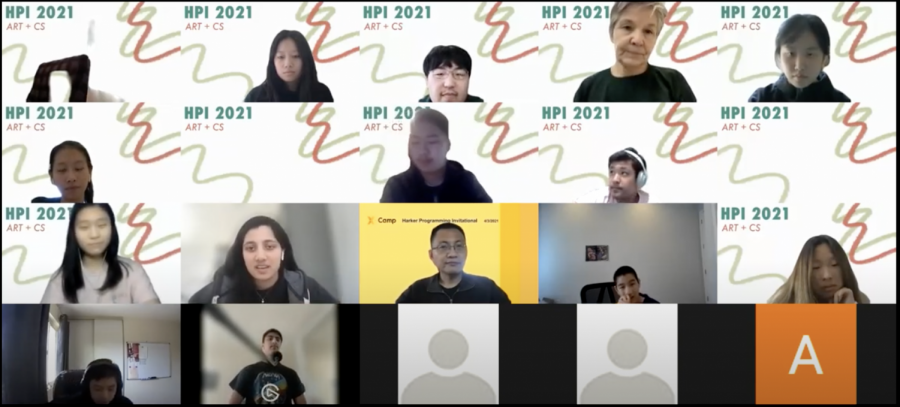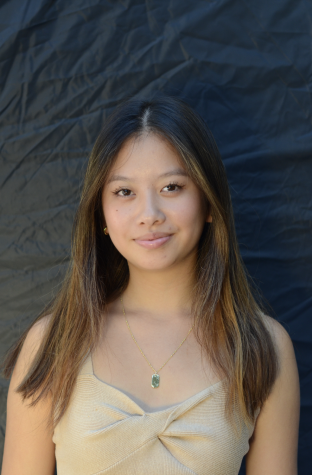Harker Programming Club hosts annual Harker Programming Invitational virtually
The Harker Programming Club (HPC) hosted the twelfth annual Harker Programming Invitational (HPI) virtually on April 3, with attendance from over 170 middle and high school students.
April 15, 2021
The Harker Programming Club (HPC) hosted the twelfth annual Harker Programming Invitational (HPI) virtually on April 3, with attendance from over 170 middle and high school students. The event consisted of a 90-minute-long coding contest, where competitors participated in teams of up to three, as well as multiple speaker activities.
Because of the pandemic, HPI was held virtually for the first time. Previously, the event took place on the upper school campus, with competitors and speakers arriving in-person.
This year, the theme of HPI was computer science (CS) and the arts, and professionals involved in the interdisciplinary field between CS and topics like music, literature, and graphics were invited to speak with participants. The problems, written by HPC officers, were also themed around the arts.
While the virtual environment made some of the organization aspects more difficult, the HPC team actually realized that there were many benefits as well. In previous years, only speakers in the Bay Area would be available, but professionals from all over the country could easily present in a Zoom meeting. Furthermore, there was participation from students across the nation as well.
“I personally have not experienced planning HPI or GPL non-virtually. I would feel like emailing would be the same, except you would need to email local professors and local industry professionals,” Alexa Lowe (11), HPC Communications Officer, said. “I think that’s an aspect of the virtual environment that’s really nice, because we can get people from the east coast or from wherever.”
Participants competed in two categories, novice and advanced, based on previous programming skill level. The contest included nine challenging algorithmic problems in each category.
“Personally, I hope [participants] recognize that for the most part, working with other people, having strategies, has value,” Susan King, upper school computer science teacher and HPC adviser, said. “It’s not a doggy-dog, I’m by myself, trying to show up you, my teammate, it’s ‘let’s do this together. Let’s figure out strategies that work for the three of us. If I take off all the pressure of winning, and I just do it with a couple of friends, this is fun stuff.’”
Following the programming session, Dr. Phillip Isola, an assistant professor at Massachusetts Institute of Technology (MIT)’s Electrical Engineering & Computer Science (EECS) department, gave a keynote speech about his work in computer vision and graphics. HPC also invited four panelists for a CS and the Arts discussion, which included Kunwoo Kim, a PhD candidate at Center for Computer Research in Music and Acoustics (CCRMA) at Stanford University; Dr. Maya Ackerman, the Chief Executive Officer and Co-Founder of WaveAI; Douglas McCausland, a composer involved with the musical applications of machine-learning; and Dr. Selmer Bringsjord, author of Artificial Intelligence and Literary Creativity: Inside the Mind of Brutus, A Storytelling Machine.
“I think it was pretty fun compared to most of the other online coding competitions. Usually, they just give you some CodeForces link, and you just go there and do that, and the competition’s pretty much over,” Aniketh Tummala (9), who participated in HPI, said. “But, first of all, HPI froze the standings, so the awards ceremony was actually interesting since you didn’t already know who won, and also they had speaker events and panels and stuff which were both pretty cool.”
To prepare for HPI, club officers completed multiple rounds of problem writing and reviewing, reached out to speakers and potential sponsors, and promoted the event with flyers. Students managed the contest platform and Zoom meetings, using club funds for any necessary purchases. Even with the virtual environment, officers met frequently to plan the event.
“The day of the competition, I felt [the officers] had it down to every few minutes, you knew when to say things, you knew when to communicate, I was flabbergasted at how smooth it was the day of it. The coordination, the amount of people, it felt like all hands were on deck. And [they] knew what they were doing,” King said.


















![“[Building nerf blasters] became this outlet of creativity for me that hasn't been matched by anything else. The process [of] making a build complete to your desire is such a painstakingly difficult process, but I've had to learn from [the skills needed from] soldering to proper painting. There's so many different options for everything, if you think about it, it exists. The best part is [that] if it doesn't exist, you can build it yourself," Ishaan Parate said.](https://harkeraquila.com/wp-content/uploads/2022/08/DSC_8149-900x604.jpg)




![“When I came into high school, I was ready to be a follower. But DECA was a game changer for me. It helped me overcome my fear of public speaking, and it's played such a major role in who I've become today. To be able to successfully lead a chapter of 150 students, an officer team and be one of the upperclassmen I once really admired is something I'm [really] proud of,” Anvitha Tummala ('21) said.](https://harkeraquila.com/wp-content/uploads/2021/07/Screen-Shot-2021-07-25-at-9.50.05-AM-900x594.png)







![“I think getting up in the morning and having a sense of purpose [is exciting]. I think without a certain amount of drive, life is kind of obsolete and mundane, and I think having that every single day is what makes each day unique and kind of makes life exciting,” Neymika Jain (12) said.](https://harkeraquila.com/wp-content/uploads/2017/06/Screen-Shot-2017-06-03-at-4.54.16-PM.png)








![“My slogan is ‘slow feet, don’t eat, and I’m hungry.’ You need to run fast to get where you are–you aren't going to get those championships if you aren't fast,” Angel Cervantes (12) said. “I want to do well in school on my tests and in track and win championships for my team. I live by that, [and] I can do that anywhere: in the classroom or on the field.”](https://harkeraquila.com/wp-content/uploads/2018/06/DSC5146-900x601.jpg)
![“[Volleyball has] taught me how to fall correctly, and another thing it taught is that you don’t have to be the best at something to be good at it. If you just hit the ball in a smart way, then it still scores points and you’re good at it. You could be a background player and still make a much bigger impact on the team than you would think,” Anya Gert (’20) said.](https://harkeraquila.com/wp-content/uploads/2020/06/AnnaGert_JinTuan_HoHPhotoEdited-600x900.jpeg)

![“I'm not nearly there yet, but [my confidence has] definitely been getting better since I was pretty shy and timid coming into Harker my freshman year. I know that there's a lot of people that are really confident in what they do, and I really admire them. Everyone's so driven and that has really pushed me to kind of try to find my own place in high school and be more confident,” Alyssa Huang (’20) said.](https://harkeraquila.com/wp-content/uploads/2020/06/AlyssaHuang_EmilyChen_HoHPhoto-900x749.jpeg)







